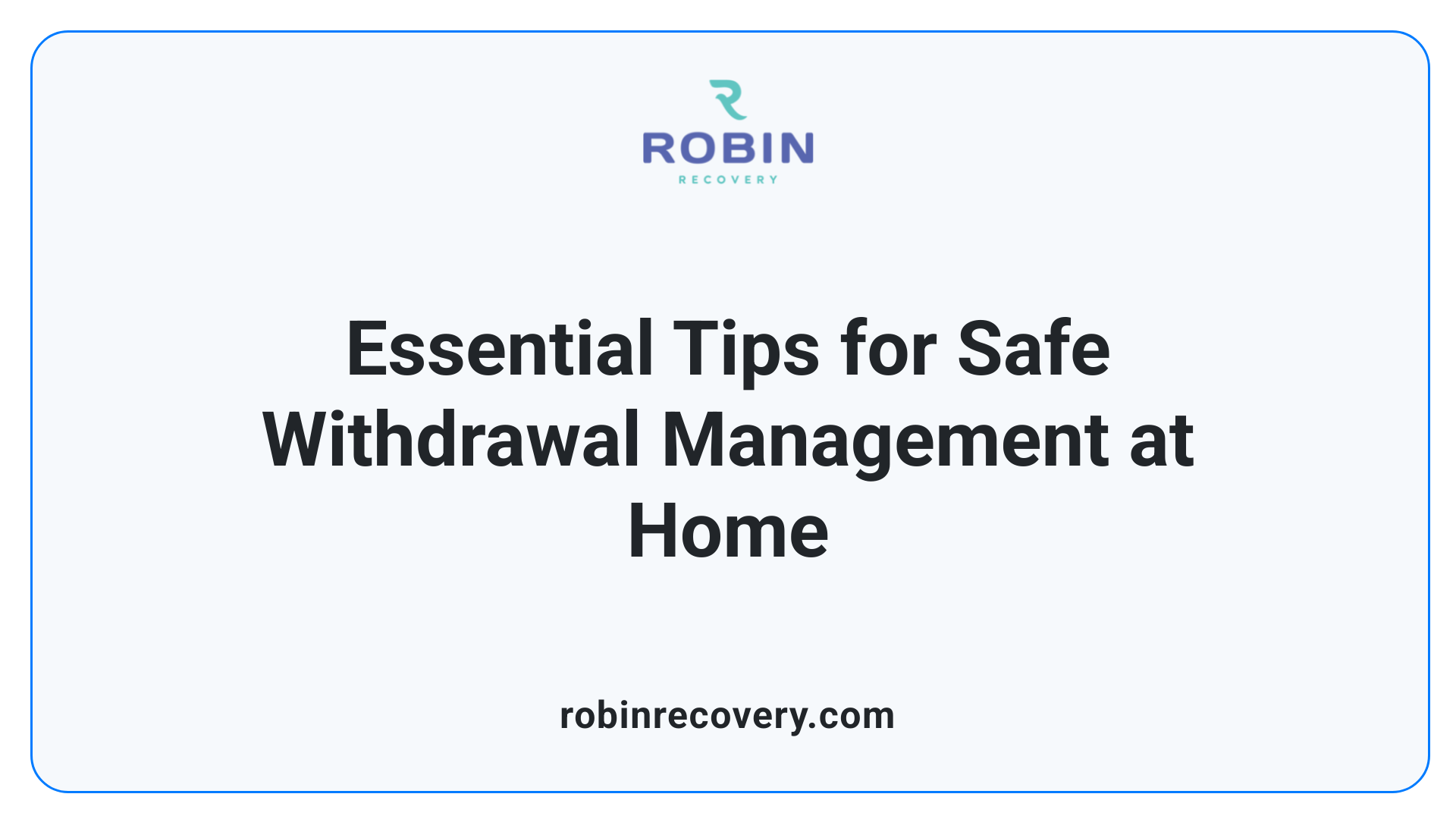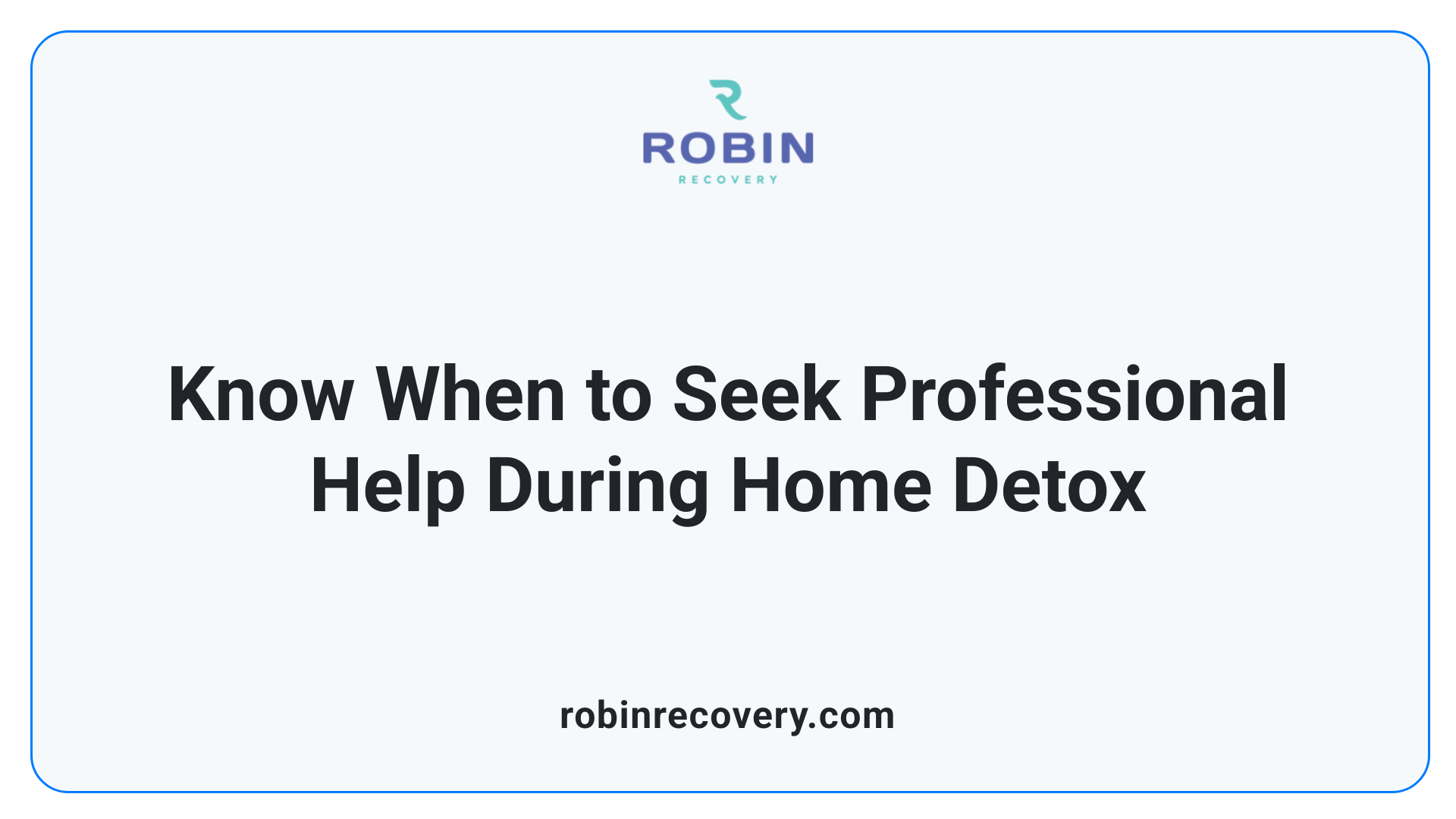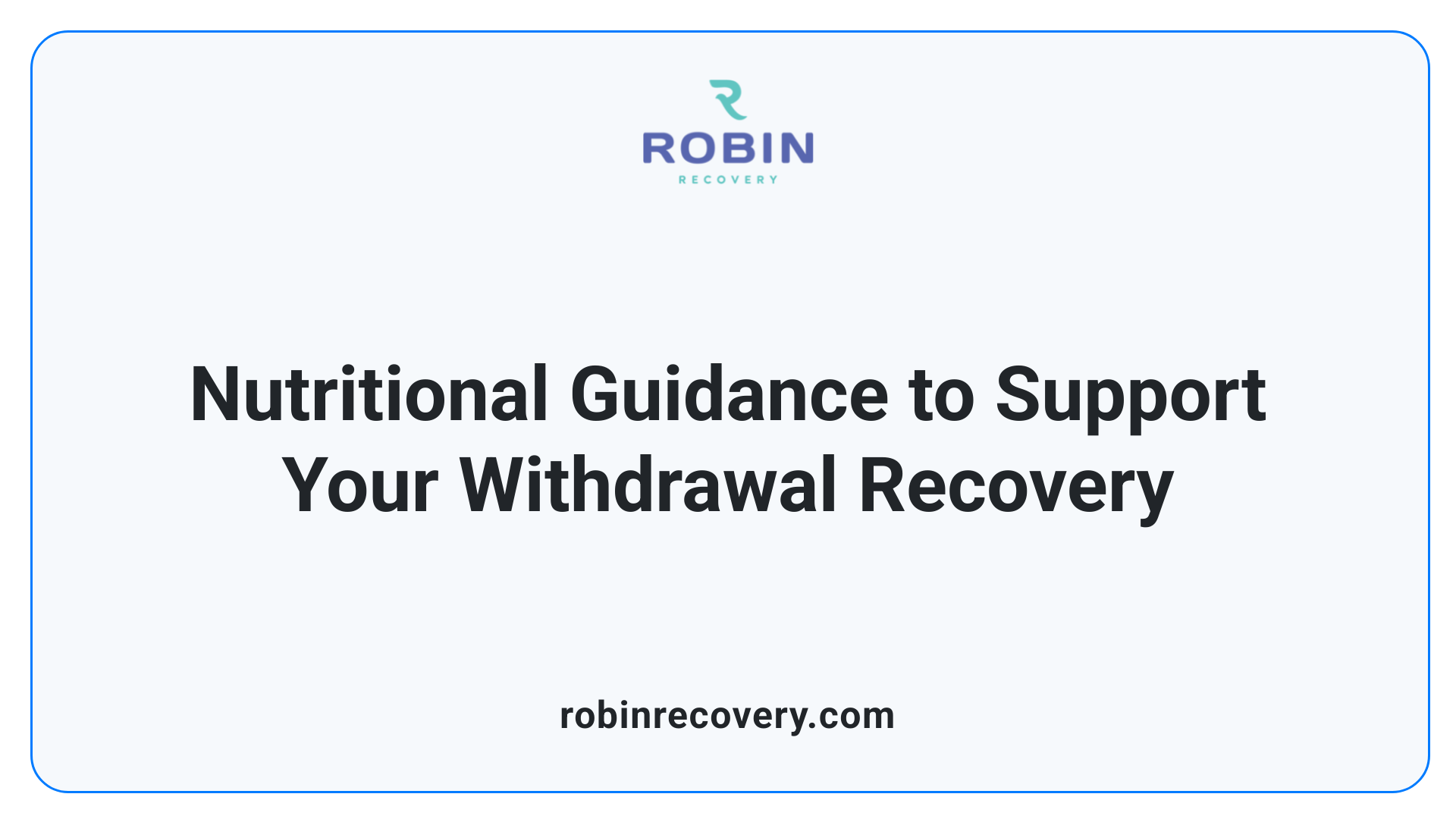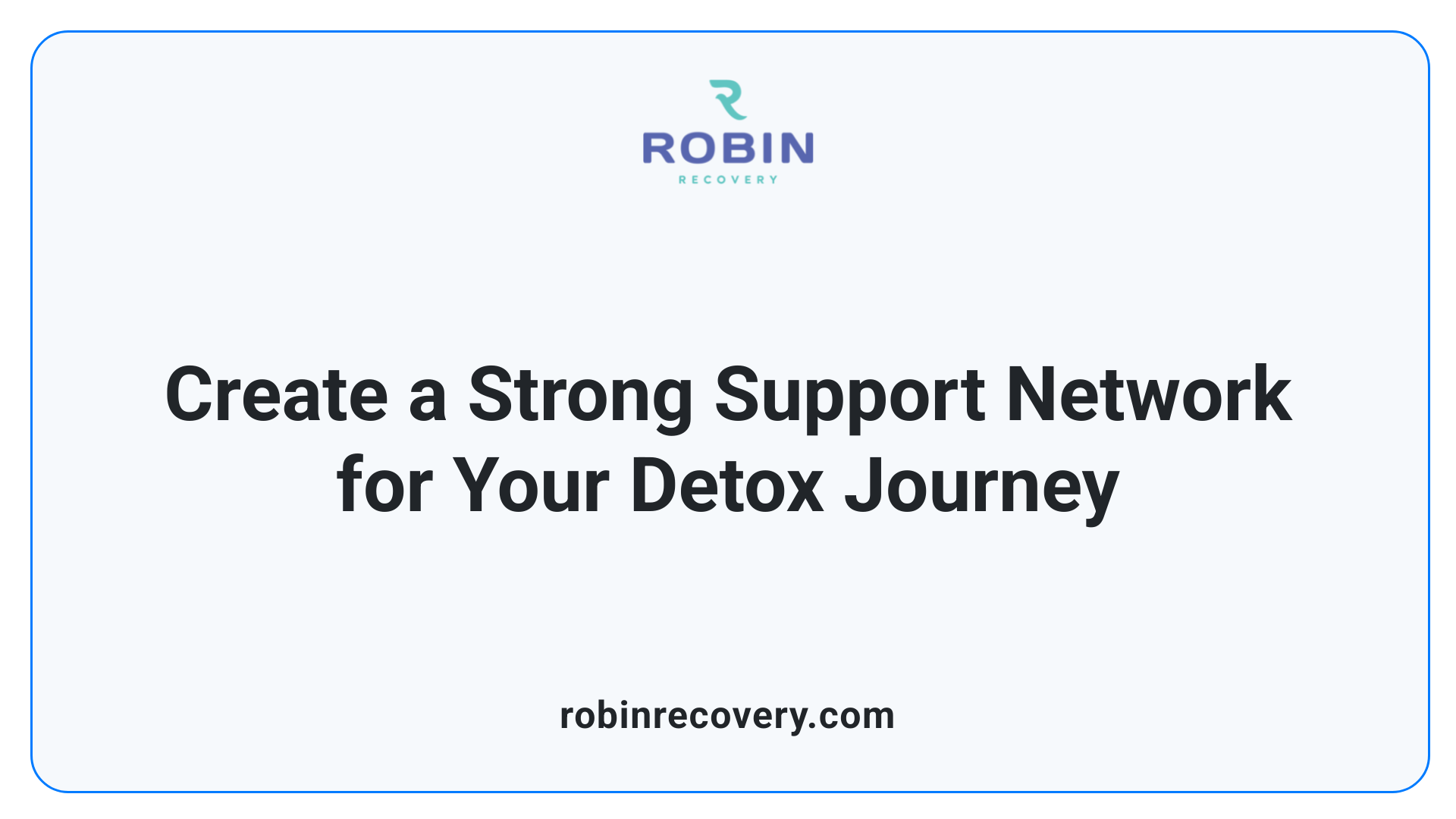How to Manage Withdrawal Symptoms Safely at Home

Understanding Home-Based Withdrawal
Withdrawal from substances can be a challenging process, and choosing to manage it at home requires careful planning and support. This guide will explore strategies for safely navigating withdrawal symptoms, emphasizing the importance of hydration, nutrition, and emotional support while outlining when to seek professional help. Whether dealing with alcohol, opioids, or other substances, knowing how to effectively manage symptoms is crucial for a successful home detox.
Home Detox: Preparing for Success

What are some effective home detox strategies?
Effective home detox strategies involve several key steps to create a safe and supportive environment while managing withdrawal symptoms effectively. Here are some guidelines:
- Consult a Health Professional: Always start by consulting with a healthcare provider to ensure safety and receive tailored advice for your specific needs.
- Create a Supportive Environment: Inform friends and family about your detox plan to build a strong support network. Encourage them to understand common withdrawal symptoms so they can provide appropriate assistance.
- Remove Temptations: Clear your home of all alcohol and drugs to eliminate triggers that could lead to a relapse.
- Stay Hydrated: Drink plenty of fluids, particularly water and electrolyte-rich drinks like Pedialyte, to combat dehydration, which can exacerbate withdrawal symptoms.
Importance of creating a supportive environment
Creating a calm and supportive environment is crucial for the success of home detox. Here’s how you can enhance your atmosphere:
- Set Up a Comfortable Space: Choose a quiet area in your home where you can relax and engage in calming activities such as meditation or light reading.
- Have a Support Person: Select a family member or friend who can stay with you during this time, providing emotional support and monitoring your symptoms.
- Plan Activities Together: Engage in distraction techniques like watching movies, going for walks, or other light activities to keep your mind off withdrawal symptoms.
Preparations for managing withdrawal symptoms
To effectively manage withdrawal symptoms at home, consider these preparations:
- Documentation of Goals: Keep a journal documenting your reasons for quitting and the pros and cons of your substance use. This can help maintain motivation during challenging times.
- Nutrition and Supplements: Maintain a balanced diet rich in fruits, vegetables, and lean proteins. If your appetite diminishes, consult your doctor regarding necessary supplements.
- Stress Management: Practice relaxation techniques such as deep breathing, yoga, or meditation. These can help alleviate anxiety and stress that accompany withdrawal.
- Emergency Plan: Prepare for potential serious symptoms. Discuss with your support person what to do if severe symptoms occur, including how and when to seek medical assistance.
Taking these steps can significantly enhance your chances of a successful home detox experience.
Managing Withdrawal Symptoms Safely at Home

How can I manage withdrawal symptoms at home?
Managing withdrawal symptoms at home can be a challenging yet manageable task with the right strategies in place. It’s essential to focus on hydration, nutrition, rest, and exercise to improve your physical and mental health during this time.
Self-care during withdrawal
- Hydration: Staying hydrated is crucial during withdrawal. Drink plenty of fluids like water and electrolyte solutions to help flush out toxins and combat symptoms like nausea and headaches.
- Balanced Diet: Aim for a nutritious diet rich in fruits, vegetables, lean proteins, and whole grains. This will support your recovery and help stabilize your mood.
- Adequate Rest: Prioritize getting enough sleep (7-9 hours per night) to reduce cravings and aid recovery.
- Regular Exercise: Engage in light physical activity, which can alleviate stress and improve your mood. Aim for at least 30 minutes a day, but don’t force physical exertion if it worsens your symptoms.
Strategies to manage withdrawal symptoms
- Removing Triggers: Clear your home of any substances related to your withdrawal to minimize temptation.
- Engage Support: Surround yourself with supportive friends or family. Inform them about your goals so they can assist you effectively.
- Document Your Journey: Writing down your reasons for wanting to quit can provide motivation during difficult moments.
- Emergency Planning: Be ready with a plan for any potential relapses or if symptoms become severe, including knowing when to seek emergency medical attention.
Alternative therapies and home remedies
Consider holistic approaches alongside your recovery plan:
- Relaxation Techniques: Methods such as yoga and meditation can ease anxiety and help manage stress during withdrawal.
- Herbal Remedies: Natural aids like chamomile tea or Epsom salt baths may soothe withdrawal symptoms, promoting relaxation and better sleep.
- Support Networks: Joining groups like Alcoholics Anonymous provides not only encouragement but also shared experiences that can guide you in your recovery journey.
For immediate support, remember that you can contact SAMHSA’s National Helpline at 1-800-662-HELP (4357), a confidential service available 24/7 that can assist with local treatment referrals.
Medication and Supplements for Alleviating Withdrawal
What medications can alleviate the painful effects of withdrawal?
Certain medications can alleviate the painful effects of withdrawal, particularly from opioids. Clonidine is often used to help manage symptoms such as anxiety, irritation, and sweating.
Diazepam can also be effective in reducing anxiety and muscle tension during withdrawal. For minimizing nausea and vomiting, metoclopramide may be prescribed. Additionally, over-the-counter pain relief medications such as acetaminophen or ibuprofen can alleviate headaches and muscle pain.
It’s crucial to consult a doctor to create a tailored treatment plan. This helps ensure medications are administered safely and effectively. The doctor may recommend gradually tapering off opioids or other substances to help minimize withdrawal symptoms and reduce complications.
Consulting a healthcare provider
Before starting any medication or supplement for withdrawal management, individuals should consult a healthcare provider. This is especially important for those with a history of substance use disorders or other medical conditions. A professional can assess individual needs and recommend specific medications that will be both safe and effective.
Appropriate use of vitamins and supplements
In addition to prescribed medications, certain vitamins and supplements can support the withdrawal process. For example, thiamine (B1), folic acid (B9), and pyridoxine (B6) may be helpful, especially if appetite is reduced. It's important to discuss these supplements with a healthcare provider before use to ensure they are appropriate for your situation.
With the right combination of medical treatment and supportive care, managing withdrawal symptoms can be more bearable.
Essential Self-care Practices During Withdrawal
What are some self-care tips during withdrawal without medical supervision?
Managing withdrawal can be a challenging process, especially when not under medical supervision. Here are several strategies to promote self-care during this critical time:
- Nutrition tips: Focus on a balanced diet rich in nutrient-dense foods. Incorporate fruits, vegetables, lean proteins, and whole grains to support your body. Eating small, frequent meals can help maintain energy levels and reduce cravings.
- Hydration importance: Staying hydrated is crucial. Aim for at least 2-3 liters of water daily, and consider replenishing electrolytes with solutions like Pedialyte. Hydration can alleviate symptoms such as nausea and headaches.
- Lifestyle adjustments for self-care: Incorporate light exercise, such as walking or yoga, to reduce stress and improve mood. Practicing relaxation techniques, like meditation or deep breathing, can also help manage anxiety. Prioritize sleep by creating a conducive environment and aiming for 7-9 hours of rest nightly.
- Journaling: Keeping a journal can help process emotions and urges, providing an outlet during difficult times.
While these self-care methods can enhance your comfort, vigilance in monitoring symptoms is vital. If severe symptoms arise, such as seizures or delirium, seeking professional medical help is imperative. Maintaining a supportive environment and having trusted individuals to lean on can also make a significant difference in your withdrawal journey.
Professional Assistance and When to Seek It

When should I seek professional help during home detox?
You should seek professional help during home detox if withdrawal symptoms worsen, become unmanageable, or if there are signs of severe complications such as severe dehydration, uncontrollable vomiting, or hallucinations.
Why are mental and physical health considerations important?
Overwhelming feelings of anxiety, trauma, or depression can arise during the detox process, making professional support essential. Emotional and relational well-being can significantly suffer under these stresses. A healthcare professional can provide necessary tools to manage these emotions and improve overall mental health.
What is the role of professional detox services?
Professional detox services offer structured care tailored to individual needs, ensuring safety throughout the withdrawal process. With qualified staff available for continuous monitoring, they can administer medications to alleviate withdrawal symptoms, provide nutritional support, and create a calming environment.
Key Indicators for Seeking Help
Indicators Description Worsening Symptoms If symptoms intensify, such as severe nausea or pain. Severe Hydration Issues Signs of dehydration like extreme thirst or dizziness. Hallucinations and Confusion Experiencing delirium or cognitive disorientation. Emotional Distress Overwhelming feelings of anxiety or trauma requiring intervention.
Remember, engaging with professionals can make a substantial difference in your detox journey, ensuring both safety and emotional support.
Nutritional Support During the Withdrawal Process

Balancing Diet During Withdrawal
Maintaining a balanced diet is crucial during withdrawal, as it supports the body's recovery and helps reduce symptoms. Focus on nutrient-rich foods, including:
- Fruits and Vegetables: Fresh produce provides vitamins that aid detoxification.
- Lean Proteins: Chicken, fish, and legumes support muscle recovery.
- Whole Grains: Foods like brown rice and whole wheat bread offer sustained energy to combat fatigue.
Eating small, frequent meals instead of large ones can help manage appetite fluctuations commonly experienced during withdrawal.
Role of Hydration and Fluids
Proper hydration is essential in alleviating withdrawal symptoms, as it helps flush out toxins and prevents dehydration, which can be significant during this period. Recommended fluids include:
- Water: Staying hydrated helps maintain energy and prevent fatigue.
- Electrolyte Solutions: Drinks like Pedialyte can replenish lost salts and fluids.
- Herbal Teas: Ginger, chamomile, and peppermint teas can soothe digestive discomfort.
Importance of Maintaining Nutrition
A well-nourished body is better equipped to handle withdrawal symptoms. Nutrition not only boosts energy but also stabilizes moods, which can be affected during this process. If appetite decreases, consider supplements after consulting with a healthcare professional.
Engaging in healthy eating habits during withdrawal is a vital step towards recovery and will contribute positively to life beyond detox.
Building a Support Network: Keys to Success

Role of Friends and Family
Creating a support network of friends and family is essential during the withdrawal process. Support persons should be informed about their role in offering emotional encouragement and practical help. It's also helpful for them to familiarize themselves with common withdrawal symptoms, so they can better understand what the individual is experiencing. Having someone to check in on the individual can significantly enhance comfort and motivation, especially during challenging moments.
Utilizing Support Groups
Participating in support groups provides individuals with shared experiences and increased accountability. Groups like Alcoholics Anonymous (AA) offer a safe space for discussing challenges and successes in recovery. This engagement not only fosters community but also helps alleviate feelings of isolation that may arise during withdrawal.
SAMHSA's National Helpline Services
For additional support, individuals can reach out to SAMHSA's National Helpline at 1-800-662-HELP (4357). This free, confidential service operates 24/7, connecting callers with trained specialists who provide treatment referrals and information about local resources. The helpline ensures privacy and confidentiality while guiding individuals towards the help they may need, reinforcing the importance of seeking professional assistance during withdrawal.
Alternative Therapies: Enhancing Recovery
Role of alternative medicine
Alternative therapies can play an important role in enhancing recovery during withdrawal. These methods often focus on reducing stress, alleviating discomfort, and promoting overall wellness, complementing traditional medical treatments. By incorporating these practices, individuals may find relief from some of the distressing symptoms of withdrawal.
Acupuncture, yoga, and meditation
- Acupuncture: This ancient Chinese practice can aid in managing various withdrawal symptoms. Studies suggest that acupuncture may effectively reduce anxiety and discomfort experienced during withdrawal.
- Yoga: Incorporating yoga can promote physical wellbeing and mental clarity, helping individuals manage stress and anxiety. Its focus on breath control and relaxation techniques can be particularly beneficial.
- Meditation: Practicing mindfulness through meditation can improve emotional regulation and lower anxiety levels. Simple meditation techniques can help to refocus the mind and promote a sense of calm during challenging moments.
Other holistic practices
Exploring other holistic therapies can also be beneficial during withdrawal. Herbal teas, such as chamomile or ginger, can ease stomach discomfort and promote relaxation. Essential oils like lavender may alleviate anxiety. Additionally, Epsom salt baths combined with alternating hot and cold therapies can help soothe muscle tension and promote relaxation, which is vital during this recovery process.
Understanding Withdrawal Symptoms
Common Symptoms for Different Substances
Withdrawal symptoms can vary significantly based on the substance involved. Here are some common symptoms:
- Alcohol: Anxiety, sweating, shaking, nausea, irritability, increased heart rate, and in severe cases, hallucinations or seizures.
- Opioids: Anxiety, nausea, vomiting, muscle aches, diarrhea, and insomnia.
- Stimulants: Fatigue, extreme mood swings, and cravings.
- Benzodiazepines: Nausea, increased anxiety, and panic attacks.
Timeframes for Withdrawal Phases
Withdrawal typically occurs in two phases, with timelines varying by substance:
- Alcohol: Symptoms begin 6-12 hours after the last drink, peaking in severity between 48-72 hours.
- Opioids: Symptoms can start 12-30 hours post-use and last up to a week, with varying intensities.
Potential Complications
Complications can range from severe discomfort to critical conditions requiring immediate medical intervention:
- Alcohol: Severe symptoms may lead to delirium tremens, posing life-threatening risks.
- Opioids and other substances: Risks of dehydration, severe pain, or even seizures.
Understanding these symptoms and timelines is crucial for effective management and safety during withdrawal.
Safe Practices and Risks of Home Detox
Risks of Unassisted Withdrawal
While home-based withdrawal might seem feasible for mild to moderate symptoms, it carries significant risks. Many individuals have serious complications during withdrawal that necessitate medical supervision. For substances like alcohol and opioids, withdrawal can escalate quickly to life-threatening conditions such as seizures or delirium tremens. Therefore, it is essential to consult a healthcare professional before initiating any detox plan.
Creating a Safe Detox Environment
To mitigate risks during home detox, individuals should ensure their environment supports recovery. This includes:
- Removing all alcohol and drugs from the home to minimize temptation.
- Establishing a quiet, calm space conducive to rest and recovery.
- Having supportive friends or family members available to provide encouragement and monitoring.
Importance of Planning
Planning is critical for a successful home detox. Prior to starting, individuals should:
- Consult a healthcare provider to discuss medication options that may ease withdrawal symptoms.
- Document reasons for detoxing and the pros and cons of substance use, which can help sustain motivation during challenging moments.
- Create an emergency contact list for situations where immediate medical attention is required.
In summary, while home detox can be a step towards recovery, it necessitates thorough planning and caution to ensure safety and effectiveness.
Navigating the Road to Recovery
Successfully managing withdrawal symptoms at home requires a strategic approach, emphasizing self-care, emotional support, and professional consultation when necessary. While home detox can be a viable option for individuals with mild withdrawal symptoms, it's essential to prepare adequately and maintain open lines of communication with healthcare providers. Remember, the journey to sobriety is challenging—having a comprehensive plan and a strong support network can significantly improve the outcome, laying the foundation for long-term recovery.
References
- Home-based withdrawal - Alcohol and Drug Foundation
- National Helpline for Mental Health, Drug, Alcohol Issues - SAMHSA
- Home Remedies to Ease Opiate Withdrawal Symptoms - Healthline
- 11 Helpful Ways to Cope With Drug Withdrawal
- Home Remedies for Opiate Withdrawal: Natural Relief Tips
- Alcohol Withdrawal: How to Get Through It - WebMD
- Alcohol Detox at Home: Strategies and Dangers You Must Know
